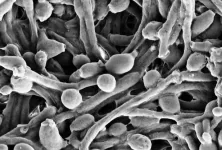Antibiotics in early life could affect brain development
Exposure to antibiotics in utero or after birth could lead to brain disorders in later childhood, says Rutgers researcher
2021-07-14
(Press-News.org) Antibiotic exposure early in life could alter human brain development in areas responsible for cognitive and emotional functions, according to a Rutgers researcher.
The laboratory study, published in the journal iScience, suggests that penicillin changes the microbiome - the trillions of beneficial microorganisms that live in and on our bodies - as well as gene expression, which allows cells to respond to its changing environment, in key areas of the developing brain. The findings suggest reducing widespread antibiotic use or using alternatives when possible to prevent neurodevelopment problems.
Penicillin and related medicines (like ampicillin and amoxicillin) are the most widely used antibiotics in children worldwide. In the United States, the average child receives nearly three courses of antibiotics before the age of 2. Similar or greater exposure rates occur in many other countries.
"Our previous work has shown that exposing young animals to antibiotics changes their metabolism and immunity. The third important development in early life involves the brain. This study is preliminary but shows a correlation between altering the microbiome and changes in the brain that should be further explored," said lead author Martin Blaser, director of the Center for Advanced Biotechnology and Medicine at Rutgers.
The study compared mice that were exposed to low-dose penicillin in utero or immediately after birth to those that were not exposed. They found that mice given penicillin experienced substantial changes in their intestinal microbiota and had altered gene expression in the frontal cortex and amygdala, two key areas in the brain responsible for the development of memory as well as fear and stress responses.
A growing body of evidence links phenomena in the intestinal tract with signaling to the brain, a field of study known as the "gut-brain-axis." If this pathway is disturbed, it can lead to permanent altering of the brain's structure and function and possibly lead to neuropsychiatric or neurodegenerative disorders in later childhood or adulthood.
"Early life is a critical period for neurodevelopment," Blaser said. "In recent decades, there has been a rise in the incidence of childhood neurodevelopmental disorders, including autism spectrum disorder, attention deficit/hyperactivity disorder and learning disabilities. Although increased awareness and diagnosis are likely contributing factors, disruptions in cerebral gene expression early in development also could be responsible."
Future studies are needed to determine whether antibiotics directly effect brain development or if molecules from the microbiome that travel to the brain disturb gene activity and cause cognitive deficits.
The study was conducted along with Zhan Gao at Rutgers and Blaser's former graduate student Anjelique Schulfer, as well as Angelina Volkova, Kelly Ruggles, and Stephen Ginsberg at New York University, who all played important roles in this joint Rutgers-New York University project.
INFORMATION:
[Attachments] See images for this press release:

ELSE PRESS RELEASES FROM THIS DATE:
2021-07-14
Scientists at Northwestern University in Evanston, Illinois have developed a hydrogel integrated with zirconium-based robust metal-organic frameworks (MOFs) that rapidly degrades organophosphate-based nerve agents used in chemical warfare. Unlike existing powdered MOF adsorbents, this hydrogel composite does not require added water and may be easily scaled up for use in protective masks or clothing. The work appears July 14 in the journal Chem Catalysis.
"Organophosphate-based nerve agents are among the most toxic chemicals known to humanity," says senior author Omar Farha, a professor of chemistry at Northwestern University. "Their use in recent global conflicts reflects the urgent need for personal protective gear, as well as the bulk destruction of ...
2021-07-14
(Salt Lake City) - Bacteria's role in gut health has received a lot of attention in recent years. But new research led by scientists at END ...
2021-07-14
BOSTON - New research in humans and mice identifies a particular signaling molecule that can help modify inflammation and the immune system to protect against Alzheimer's disease. The work, which was led by investigators at Massachusetts General Hospital (MGH), is published in Nature.
Cognitive decline associated with Alzheimer's disease develops when neurons begin to die. "Neuron death can be caused by improper immune responses and excessive neuroinflammation--or inflammation in the brain--triggered by high levels of amyloid beta deposits and tau tangles, two hallmarks of Alzheimer's disease," explains the paper's co-senior author Filip Swirski, PhD, who conducted the work while a principal investigator in the Center for Systems Biology at MGH. ...
2021-07-14
BOSTON - Over the last decade, investigators at Beth Israel Deaconess Medical Center (BIDMC) have been at the forefront of the effort to END ...
2021-07-14
New York, NY--July 14, 2021-- A previously unknown kind of human brain cell appears to help people center themselves in their personal maps of the world, according to a new study from neuroscientists at Columbia Engineering. This discovery sheds light on the cellular mechanisms underlying navigation and memory in humans, as well as what parts of the brain might get disrupted during the kinds of memory impairments common in neurodegenerative diseases such as Alzheimer's.
There are two strategies with which humans and animals navigate and orient themselves. One involves locating places, distances and directions in "allocentric" or other-centered ...
2021-07-14
What The Study Did: The COVID-19 pandemic was associated with a decline in addiction treatment initiations but more research is needed to understand the cause of the decline in initiations and the extent to which it was due to reduced demand for services or reduced ability to supply treatment.
Authors: Tami L. Mark, Ph.D., M.B.A., of RTI International in Rockville, Maryland, is the corresponding author.
To access the embargoed study: Visit our For The Media website at this link https://media.jamanetwork.com/
(doi:10.1001/jamanetworkopen.2021.17029)
Editor's Note: The article ...
2021-07-14
What The Study Did: In this randomized clinical trial, a physician messaging campaign was effective in increasing COVID-19 knowledge, information-seeking and self-reported protective behaviors among diverse groups.
Authors: Esther Duflo, Ph.D., of the Massachusetts Institute of Technology in Cambridge, is the corresponding author.
To access the embargoed study: Visit our For The Media website at this link https://media.jamanetwork.com/
(doi:10.1001/jamanetworkopen.2021.17115)
Editor's Note: The article includes conflict of interest and funding/support disclosures. Please see the article for additional information, including other authors, author contributions and affiliations, conflict of interest and financial disclosures, and funding and support.
# # ...
2021-07-14
What The Study Did: About half the women experiencing homelessness and unstable housing who were surveyed experienced symptoms of depression or anxiety or both during the pandemic and, in addition to unmet subsistence needs and social isolation, these symptoms were associated with increased challenges accessing non-COVID-19 care and managing symptoms for chronic medical conditions.
Authors: Elise D. Riley, Ph.D., M.P.H., of the University of California, San Francisco, is the corresponding author.
To access the embargoed study: Visit our For The Media website at this link https://media.jamanetwork.com/
(doi:10.1001/jamanetworkopen.2021.17035)
Editor's ...
2021-07-14
What The Study Did: This study found an unequal pattern of COVID-19 outcomes that was associated with the socioeconomic circumstances in regions of Japan, suggesting that these disparities in COVID-19 outcomes aren't unique to the United States and Europe.
Authors: Yuki Yoshikawa, M.D., M.P.H., of the Harvard T.H.Chan School of Public Health in Boston, is the corresponding author.
To access the embargoed study: Visit our For The Media website at this link https://media.jamanetwork.com/
(doi:10.1001/jamanetworkopen.2021.17060)
Editor's Note: Please see the article for additional information, including other authors, author contributions and affiliations, conflict of interest and financial disclosures, and funding and support.
# ...
2021-07-14
The COVID-19 pandemic has amplified calls to end the detention of migrant children, as cases surge among children held in crowded conditions; yet immigration detention's threats to children's fundamental rights did not begin with the current public health crisis.
Unlike nearly three-quarters of high-income countries, however, the U.S. has no laws specifically limiting the detention of accompanied migrant and asylum-seeking children, according to a new study by the UCLA Fielding School of Public Health's END ...
LAST 30 PRESS RELEASES:
[Press-News.org] Antibiotics in early life could affect brain development
Exposure to antibiotics in utero or after birth could lead to brain disorders in later childhood, says Rutgers researcher


